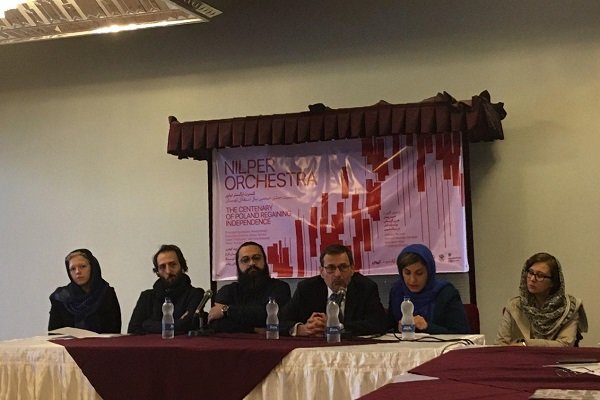2018 marks the the centenary of the state of Poland regaining its independence. The Chargé d'affaires at Polish Embassy in Tehran, Mr. Wojciech Unolt, put special emphasis on the word ‘regaining’ during a press conference held on the occasion at Vahdat Hall, a performing arts complex in downtown Tehran, on November 11.
Vahdat Hall was hosting the presser since the arts complex has been chosen as the venue for a major classical concert to be jointly performed by Iranian and Polish musicians in celebration of the 100th anniversary of Poland regaining its sovereignty (11 Nov. 1918).
The Polish chargé d'affaires was joined by executive director of Nilper Orchestra, Ehsan Tarokh, artistic director and principle conductor of Nilper Orchestra, Navid Gohari, and Polish musician and guest conductor Martyna Kosecka, who in turn gave a brief introduction on the joint classical concert scheduled for November 17.
Talking about the significance of Nov. 11 for Polish people, a day celebrated around the world as the Armistice Day – a day that ended the First World War – Mr. Unolt said that for Poles, the National Day is not the independence day, but rather the ‘regaining’ of independence.
“The polish independent state was born more than 1,000 years ago,” he said. “And for several centuries, it was one of the biggest states in Europe. In the beginning of 19th century, however, Poland disappeared from the political map of Europe.”
He added that this period during which Poland did not exist as a political entity corresponds more or less to the Qajar dynasty which ruled Persia from 1794 to 1925.
For more than 100 years, Poles had been under foreign dominion in their country, he said, adding that independence finally came only at the end of First World War.
While it is the diplomatic norm to celebrate a country’s national day by holding a formal reception at the embassy for a specific guest-list including the authorities of the host country, as well as friends and colleagues, this year, Poland has decided to commemorate the event with another goal in mind: to make the occasion an opportunity for Iranian people to get to know the Polish culture a little better.
“It seemed to us that with Iranian public listening together to Polish and Iranian music executed jointly by Iranian and Polish musicians in Tehran would be a far better way to celebrate the centenary of Poland’s independence,” said Mr. Unolt.
A cultural interaction through the medium of music indeed sounds like a good idea to bring the focus on what matters the most: the commonalities.
Music is a universal language, Mr. Unolt touched upon this very well-known fact, which was even proven by a study at Harvard University that underlined that “our shared psychology produces fundamental patterns in song that transcend our profound cultural differences.”
The Polish envoy maintained that the main idea behind the concert was so that the people of both nations could easily communicate with one another through the medium of music; “by listening to the music produced by musicians of both countries, the audience can feel and experience how close we are to one another, and how many values and sentiments we share,” he added.
“Our hope is that this concert will contribute not only to make Polish history better known to Iranian public but also to share common values and sentiments,” he stressed.
The concert, partly sponsored by the Polish Embassy in Tehran, will be performed by Nilper – a privately-owned orchestra founded in 2006 with a focus on performing both classical and contemporary music.
The event, slated for November 17, will be held in two parts: the first part will be performed under the baton of Iranian conductor Navid Gohari, and the second part will be conducted by Polish pianist, composer and conductor Martyna Kosecka.
Kosecka is no stranger to the Iranian classical music scene, as well as the Persian language. In 2013, together with Iranian composer Idin Samimi Mofakham, she co-founded Spectro Centre for New Music, specializing in giving workshops in area of modern music and organizing concerts. Their intensive efforts helped to run the 1st International Contemporary Music Festival in Tehran.
Good news for classical music lovers on November 17: Kosecka will conduct Frédéric Chopin's Piano Concerto No. 1 in E minor, Op. 11, written in 1830. The conduction of a piece written by the great Polish composer by another Polish musician will be indeed a memorable experience that cannot be simply be missed.
Those interested to obtain tickets for the performance may visit this webpage.

























Your Comment